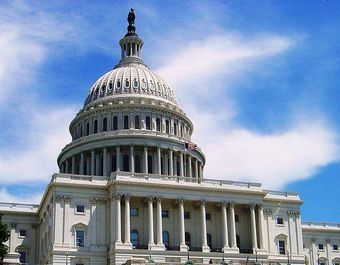 The
U.S. Capitol building/Credit: Wikimedia Commons
The
U.S. Capitol building/Credit: Wikimedia Commons
The $1.1 trillion catch-all spending bill negotiated by Congressional leaders and published on Monday night shaves away at several of the Obama administration's climate priorities, propping up fossil fuels at the expense of clean energy programs.
But the administration avoided devastating cuts to its agenda in the "omnibus" appropriations bill, a compromise between the Democrats who control the Senate and the Republicans who dominate the House of Representatives. The bill does not go as far toward hamstringing the administration as the forces opposed to climate action wanted. And the administration retains considerable leeway in its own campaign to exert as much influence over climate policy as it can without Congressional legislation.
According to a memo from Rep. Hal Rogers, the Republican chairman of the House Appropriations Committee, the overall intention of the bill's $10.2 billion for energy spending, was "to support energy programs that encourage U.S. economic competitiveness and help advance the nation's goal of an all-of-the-above solution to energy independence." That language, with no mention of climate change objectives, signaled the success of House Republicans in steering the energy budget more toward fossil fuels than the administration would have preferred.
The Department of Energy's main green technology effort, its Energy Efficiency and Renewable Energy program, gets $1.9 billion in the current fiscal year—$182 million more than in 2013 but nearly a third less than what President Obama had sought. Among other things, the program pays for innovations in biofuels, clean cars, and manufacturing, and for home weatherization grants. The administration will not be able to do nearly as much as it wanted in several areas, but it escaped the more devastating reductions that the House had recommended several months ago.
The bill will direct more of the DOE's research money into coal, oil and natural gas, according to summaries posted by the House and Senate appropriations committees.
Here, verbatim, is how the Rogers memo described the Energy Department's marching orders:
►$562 million for research and development to advance coal, natural gas, oil, and other fossil energy technologies, an increase of $28 million (5.3%) above the fiscal year 2013 enacted level and $141 million (34%) above the President's request, to help the country make better use of our domestic resources and reduce energy costs;
►$889 million for nuclear energy research and development, an increase of $36 million (5%) above the fiscal year 2013 enacted level and $154 million (21%) above the President’s request, to further the next generation of nuclear power while ensuring the safety and longevity of our current plants;
►$1.9 billion for energy efficiency and renewable energy programs—placing priority on advanced manufacturing and weatherization assistance. This funding will make responsible investments in effective and proven programs, while holding the line on irresponsible increases in other areas. This total is $874 million—or 32%—below the President’s request.
In a favor to coal interests, Congress restricted enforcement by the Export-Import Bank and the Overseas Private Investment Corporation of a new policy blocking loans for building coal-fired power plants around the world. The Obama administration has joined other international development organizations in trying to cut back on this kind of lending.
If Obama is intent on using executive actions to advance his climate agenda, it appeared that some members of Congress are just as determined to use the power of the purse to stymie some of his plans.
But in the greater context of a far-reaching spending compromise that avoided the kind of deadlock that shut the government down when the fiscal year began on Oct. 1, the restrictions imposed by the bill were relatively few and somewhat innocuous. There was nothing like an order to approve the controversial Keystone XL pipeline, for instance, or to open up oil drilling in the Arctic refuge.
"As with any compromise, not everyone will like everything in this bill," Rogers said in a joint statement with Sen. Barbara Mikulski, the Democrat who chairs the Senate Appropriations Committee. "But in a divided government a critical bill such as this simply cannot reflect the wants of only one party."
Some of the restrictions on climate-related policies were mainly symbolic, such as prohibiting the administration from requiring old-fashioned incandescent light bulbs from being phased out and replaced by modern, efficient bulbs.
There's also a prohibition on requiring any emissions permits under Title V of the Clean Air Act to control greenhouse gas emissions from the "biological processes" of livestock, as the bill somewhat delicately puts it. The Environmental Protection Agency has made it clear that its priorities lie elsewhere, especially in its proposed regulations on carbon dioxide emissions from coal plants, and pro-coal lawmakers did not block those rules.
The bill also demands that the administration provide, within 120 days of submitting its budget request for the next fiscal year, a comprehensive report with a complete tally of all spending related in any way to climate change—agency by agency, program by program, and line by line, in 2013 and 2014.
That could be a sign that Congress wants to eliminate any programs it deems to be duplicative, overlapping or unnecessary. Or, looked at another way, it could mean that Congress truly wants to get back to what legislators call "regular order," a process in which committees actually draft and mark up detailed appropriations bills over the course of each spring and summer, and get them to the president's desk for signature by September, avoiding the helter-skelter approach that produced this omnibus legislation.
© InsideClimate News
http://insideclimatenews.org/content/budget-deal-protects-fossil-fuel-interests